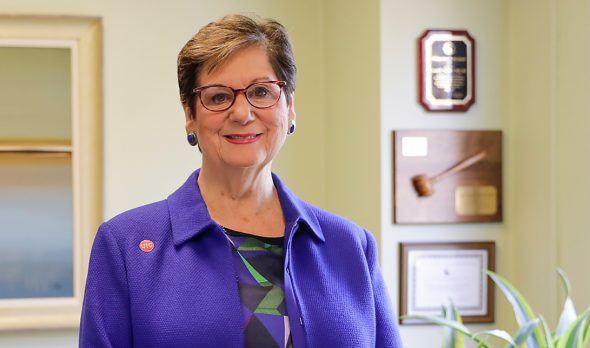End of shift
When Terri Weaver came to the UIC College of Nursing 11 years ago to become the dean, she had never lived in the Midwest. She was a sleep researcher who had spent 30 years on the nursing faculty at the University of Pennsylvania. She’ll leave in August 2021, having made a remarkable impact in Chicago and beyond.
Under Weaver’s leadership, the college expanded from five campuses to six with the addition of Springfield. She left no campus untouched, making major physical enhancements to each one. She developed a partnership with alumna and philanthropist M. Christine Schwartz, BSN ’70, to overhaul the Chicago campus’s aging building and create a cutting-edge simulation lab. She’s forged new global health partnerships, strengthened shared governance with students and faculty, and mentored future academic leaders.
Most importantly, she dedicated herself to advancing the college’s tripartite mission of excellence in teaching, transformative research and community-based practice.
Weaver says the most rewarding part of being dean is seeing the accomplishments of faculty and alumni, and welcoming new graduates to the alumni ranks at commencement.
“It’s just wonderful to see those nearly 400 graduates every year,” she says. “It’s the faculty and staff that do the bulk of the work, but I’d like to think I have some part to play in every class we graduate.”
Review session with Dean Weaver: Her own reflections on her career
My dad was an engineer and my mom was a nurse, although she kept trying to talk me into being a teacher. There were not a lot of choices for women at the time. But I always loved science and the caring part of nursing. My entire life, I wanted to be a nurse.
Being dean doesn’t get good PR, and it should, because it’s great fun.
I went into research and academia kicking and fighting. I said many times that I would not ever get a doctorate. But as I practiced with the pulmonary team, there was a question that arose that I couldn’t answer. I saw some individuals who were really disabled by their COPD (chronic obstructive pulmonary disease), and some who were not as much. I didn’t understand why some people were more functional with the same level of disease than others. It became my dissertation.
I entered my doctoral program with no children and came out with two, four years later. I always tell students worried about graduate school with young kids that it’s the best time, because they still take naps and you can get things done.
The invention of the continuous positive airway pressure [CPAP] machine for the treatment of obstructive sleep apnea has mirrored my own career. When I was in pulmonary practice, OSA was still a relatively new syndrome. The way we treated it was to do the tracheostomy, and I would teach patients how to care for it after the procedure. I was there from the beginning.
I developed a tool during my postdoc to evaluate daily functioning related to sleepiness. That tool has now become the gold standard in the field to look at outcomes related to sleep disorders and their treatment.
When the dean at Penn Nursing, Afaf Meleis, asked me to be the department chair, I said, “I don’t think I want to do that.” I enjoyed teaching and was a funded investigator. I was a very happy camper. I asked who else she was considering, and she said, “You’re it.” I’m indebted to her because I was in that position for eight years, and it led me to this job.
My leadership style is participative. I like having a team. I like consulting the team, but in the end, the buck stops with me.
One of the most phenomenal things about our college is that people step up to leadership.
Before coming to Chicago, I was an East Coast girl. I only knew one way; I had spent pretty much my whole career at Penn. I thought it was important for me to see another part of the country and another way of doing things. I love it here. I love the Midwest.
Nursing is not a stagnant career. It allowed me to have an evolution. I wasn’t always at the bedside; I wasn’t always a specialist. I’ve had an academic career and a career as a researcher. It’s not homogenous. You can do all kinds of great things.

